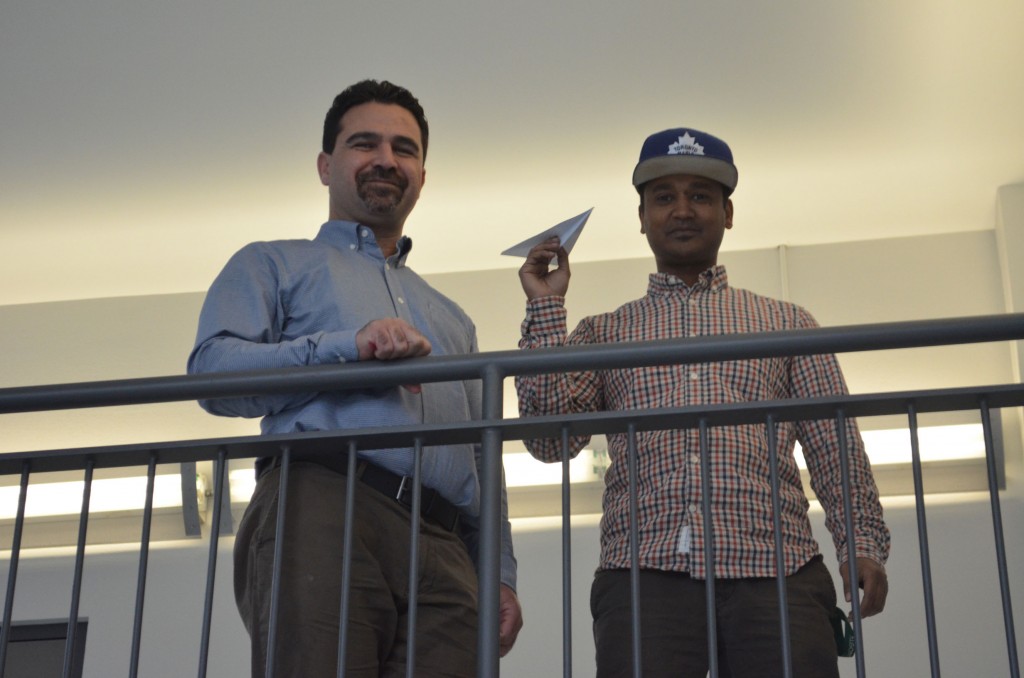
Even a failure can mean success.
For many of the third-year civil engineering students, this is something to keep in mind while planning the leadership portion of their final project.
“I have the students lead an activity that is completely unrelated to their course material,” said Francesco Tangorra, coordinator of the civil engineering program. “We want to make sure the students don’t come out of here just thinking dollars and cents.”
Most of the leadership activities chosen by the student groups this year are projects that have been successfully planned by students in the past – egg-dropping competitions, organized mentorships, popsicle-stick building competitions and training sessions for other students.
But for the first time ever, Ali Molani and Dawit Asfahar, both third-year civil engineering students, are organizing a paper airplane competition to take place in the ACCE building on Nov. 21 that will be open to everyone at Algonquin.
“It’s something that as a faculty we’ve been kicking around for a while and now it will actually be offered,” said Tangorra, with a smile. “The paper airplane competition may sound a little goofy or silly, but when you start thinking about what’s involved with it, it’s not just folding paper and throwing it.”
“We have no previous project to mentor us, so it will be trial and error.”
Students who participate will be timed on the creation and departure of their paper airplanes, which are to be thrown off the second floor in ACCE building. Time starts the moment students begin folding their flights and ends when the planes reach the ground floor in the atrium.
Molani and Asfahar not only booked the space for the event from 2:15 p.m. to 3:15 p.m., but also contacted physical resources to make sure the Living Wall would be of no concern when throwing the airplanes.
“We have a lot to think about. We’re most nervous about people not showing up,” said Molani. “We have no previous project to mentor us, so it will be trial and error.”
Molani and Asfahar organized for all of the prizes to be donated by the Students’ Association and even approached several program coordinators in ACCE to see if they would be willing to give bonus marks if their students participated.
“Planning this is a lot more work than we thought,” said Asfahar. “We just hope we can pull it off.”
However, according to Tangorra, pulling the competition off smoothly is not the only factor he looks at when grading their leadership. It’s the sweat and effort put into the plan behind the event.
“As long as I have a smile on my face, then the students will get an A,” he said. “For this project, I allow them to fail – and that doesn’t mean a failing grade. It just means it may not have worked out as planned.”
One such example is Kenton Coleman and Evan Modler, also third-year civil engineering students, who forfeited their original plan to organize training sessions within the construction industry that would be made available for Algonquin students. Although last semester a group of students successfully undertook the same project, this year’s technical requirements have changed, so the cost for the session is 10 times more expensive.
They, along with Tangorra, decided it was not viable.
“I couldn’t sign off on it. Sometimes students try to do something, they put a lot of effort and it just doesn’t work,” said Tangorra. “That’s not a fail. In the engineering world, even a failure is a result.”
Although Molani and Asfahar are hoping for a great turnout, they’ve both said the time they put into planning the paper airplane competition will be worth it – regardless of the participation outcome.


